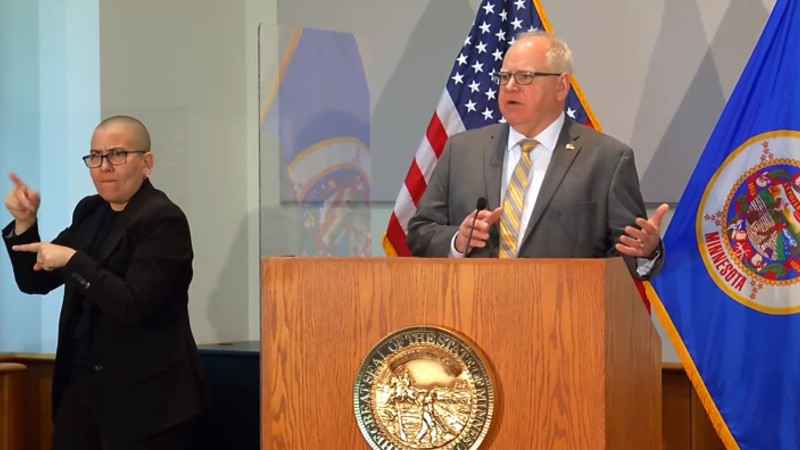Minnesota lawmakers reach budget agreement; special session being planned
[anvplayer video=”5030023″ station=”998122″]
Minnesota lawmakers have reached an agreement on a budget bill on the final day of the legislative session.
Gov. Tim Walz, Speaker of the House Melissa Hortman and Senate Majority Leader Paul Gazelka discussed the agreement during a press conference Monday morning.
All three leaders touted the agreement as a win for both sides and a win for the state as a whole but noted there is still more work to do now that the budget targets have been set.
However, a special session will still be needed to finalize details and draft the legislation.
Planning for when that special session will be held is underway, but KSTP Political Reporter Tom Hauser reports it will likely be no later than mid-June.
A special session will be needed even with a deal on budget and policy issues because thousands of pages of bills still need to be drafted and details worked out. No chance of that happening by midnight deadline tonight. Special session likely no later than mid-June. pic.twitter.com/t6LzkDyBxI
— Tom Hauser (@thauserkstp) May 17, 2021
While the specifics of the deal are still being finalized, Walz and Hortman highlighted the large investments in education funding while Gazelka said Republicans are proud of the tax cuts, including tax breaks on Paycheck Protection Program loans and unemployment insurance benefits.

Gov. Tim Walz speaks during a press conference on Monday, May 17, 2021.[KSTP]
"Each of us got priorities that we see. I think when you do that, there’s a pretty good argument to be made, that a broader swath of Minnesotans are going to feel served by this budget than if one of us did it, or if it went one way," Walz said.
Gazelka said there was no reason to raise taxes with so much surplus state and federal revenue in the system.
"As we began the year we said we’re not going to raise taxes, we’re going to focus on recovering from COVID, we’re going to pay attention to what families need and I feel like this agreement on the spending targets fits all of that," Gazelka said.
The leaders also said work will continue on other issues like police reform and emergency powers legislation.
"Now on the policy side we do have more work to do," House Speaker Melissa Hortman said. "And really pivotal among that is criminal justice reform. I think there’s a lot of area for agreement and we look forward to working with our community and law enforcement partners to get an agreement that can pass a Republican Senate and a Democratic House and be signed into law by a Democratic governor."
One word of caution comes at the end of the two-page agreement signed by the governor and legislative leaders. "The global targets agreement reached by the governor, Speaker of the House and Senate Majority Leader does not ensure approval of any omnibus bills," the agreement says.
Spreadsheets for each of the bills are due by May 28 and language of the bills by June 4. There will likely be a special session around June 14 when the governor is likely to request another 30-day extension of his emergency powers.
The governor also issued the following statement:
"This bipartisan budget confronts the challenges we face today while investing in the future to help Minnesotans emerge from this crisis stronger than before. Not every Minnesotan was hit by COVID-19 equally – many families and small businesses have struggled tremendously over the past year. That is why it’s so important that we make it easier for families to get by, ensure our students catch up on learning loss, and provide support to our small businesses."
"I’m proud that the agreement we reached makes historic investments in education while providing tax cuts for Minnesotans across the state. This demonstrates that, despite a divided legislature, Minnesotans are united by our shared values: We look out for our neighbors, we want everyone to have an opportunity to succeed, and we all do better when we all do better."
House Minority Leader Kurt Daudt, (R-Crown), issued the following statement:
"There are still significant parts of the budget agreement left unfinished including a clear end to the emergency powers and the legislature having full control over federal aid," Daudt said. "We need the legislature to take back its role as a co-equal branch of government. House Republicans look forward to working toward that goal as well as discussions about the size and scope of any bonding bill.
"It’s unfortunate that Democrats held out for tax hikes and pushed our budget into overtime, and continue to delay passage of PPP/UI relief despite taxes being due today for Minnesota workers and businesses."